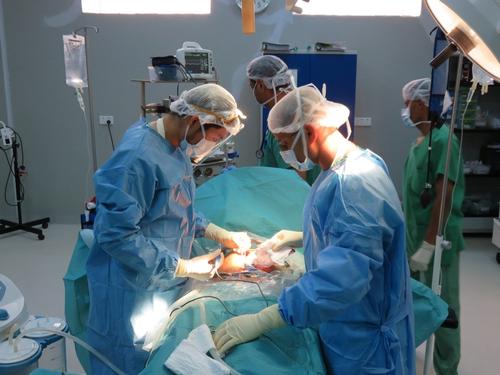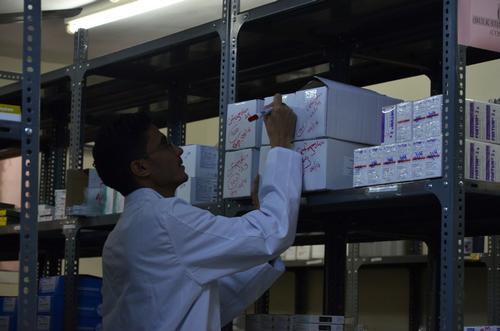Overview
The population is suffering enormously. Violence and insecurity are affecting them on a daily basis. Access to healthcare, food, water and fuel is problematic. Hospitals are in need of more medical supplies beyond what ICRC & MSF can provide. People are traumatized due to the bombardment and fighting, and their lives are made harder by the economic pressure and increase in prices.
- Over 1,266 war wounded have been treated by MSF teams since 19 March (775 Aden, 101 Haradh, 40 Amran, 350 Ad-Dhale)
- MSF has treated wounded from air-strikes in Amran, Ad-Dhale and Hajjah governorates, and has donated medical supplies to hospitals in Sana’a receiving wounded from air-strikes.
- MSF has a total of 565 people working in the Yemen: 534 Yemeni and 31 international staff.
- We have been able to send in emergency surgical teams and around 100 tonnes of medical supplies by sea and air, but much more is needed. Assistance needs to be scaled up dramatically. Humanitarian aid organisations must return to Yemen and start providing assistance to the population urgently.
- In Aden fighting, attacks on ambulances, snipers and road blocks, make it difficult for patients to come to the hospital. The number of wounded we are receiving has dropped, despite the intensity of fighting.
- It remains extremely difficult to move within the country to assess the needs and deploy assistance, due to fighting and air-strikes.
Per-project updates
Aden Clashes continue in the southern city of Aden where MSF is running its Emergency Surgical Unit. There are continued street battles as well as shelling from the ground, air and sea in some areas. There have been electricity, water and fuel shortages in the city and communications networks are often down.
Since 19 March MSF has received more than 775 injured at the hospital. We received more than 550 injured between March 19 and 31 March. However, since the beginning of April, the number of patients has decreased to around 10 per day, despite the clashes continuing and increasing in some areas, pointing to difficulties in access to the hospital.
Difficulties in accessing the hospital are caused by blockages to roads, movement being very risky due to fighting and snipers, and ambulances having been attacked and hijacked. Seven MoH ambulances have gone missing. Two Yemeni Red Crescent volunteers were killed on Friday 3 April while in an ambulance. Our staff are still finding difficulties going to and from the hospital, and we have some staff who have been living at the hospital.
We are working with all parties to ask them to respect the hospital, ambulances and medical staff, and to allow unhindered access to the hospital for patients. MSF has sent out a number of local communications to express concern over the lack of access for patients to the hospital and to call for respect for ambulances, health workers and patients. We have also been using social media to ask for the respect of ambulances, health workers and medical structures, so patients can access treatment.
The MSF hospital in Aden has been hit by a number of stray bullets, with some windows broken. On 16 April an air-strike less than 500 metres from the hospital led to a number of broken windows and shrapnel was found in the hospital courtyard.
On 20 April, an ambulance trying to refer two patients from a clinic in Lahj to our hospital in Aden was stopped at a checkpoint and turned back; one patient later died.
In order to reach patients in areas of intense fighting, MSF has been supporting an advanced medical post in the Crater area of Aden from 20 April. The medical post received 12 wounded in the first two days.
Ad-Dhale
Qataba and Al Nasser hospitals have received 350 war wounded patients since 19 March.
On 6 April MSF received 17 wounded and 3 dead in Al Nasser Hospital, and 3 wounded in Qataba Hospital. On 19 April, more than 30 wounded were treated at Al Nasser and Qataba hospitals.
Referrals between Ad-Dhale and other hospitals, including the MSF hospital in Aden, remain extremely difficult.
Sana’a
On 20 April a huge explosion in south-west Sana’a caused 574 injuries and 39 deaths, according to the Ministry of Health. The injured were received by at least 10 hospitals in Sana'a, three of which were supported by MSF with donations of dressing kits, drugs and medical supplies. Psychological support for victims was also provided at one of these hospitals, and 1,000 litres of fuel was donated to another.
There are serious shortages of fuel and prices are increasing. People continue to leave the city. The fuel crisis continues to the extent that some hospitals cannot operate any longer.
Our teams are still alert and monitoring the needs. They are in touch with the MoH and hospitals in the city. We are providing ER and OT supplies to Al Jumhoori hospital, in Sana'a.
The regular HIV project in Sana'a shifted to a contingency plan of distribution of drugs to make sure that people living with HIV enrolled on the programme in Sana’a have access to ARVs, with stocks available for the coming two months.
Amran
We have received around 40 injured in the town of Khamer, where MSF runs a hospital, due to airstrikes in Amran governorate. This included 30 injured who were treated in Khamer on 15th April after an airstrike on the town of Huth. The injured included women and children.
The team is also concerned about people in remote areas of Amran governorate being unable to access the hospital in Khamer due to difficulty of transport and shortage of fuel. We are seeing less patients from Al-Asha and Al-Qafla districts and are particularly concerned for women from these areas with complicated pregnancies.
The team is also assessing the situation of IDPs flowing into the governorate, and is ready to respond. IDPs are generally staying with relatives, but there are reports food shortages. Drinking water is also lacking due to shortages of fuel for the water pumps. There has been no electricity in Khamer for two weeks.
In the town of Huth, where MSF supports the health centre, staff and patients are scared to go to the health centre, for fear of bombing.
Haradh Town in Hajjah governorate north of Yemen
On 30 March, 34 wounded were brought to the MSF-supported hospital in Haradh after the attack on Al-Mazraq IDP Camp. Between 21 and 24 April airstrikes and shelling in Haradh district have caused 11 deaths and 67 wounded. The 67 wounded were treated by MSF medical staff in Haradh public hospital. The latest attack took place on the night of 24 April, when several shells hit Haradh town. Large pieces of shrapnel landed less than 30 metres from Haradh public hospital, as medical staff received the first wounded. Nine injured arrived at the hospital; two of them died. The attacks have provoked a mass movement of population with most of Haradh town’s remaining inhabitants abandoning their homes. The majority of staff and patients at the hospital have also fled.
The team has been supporting Haradh hospital in the emergency room and the operating theatre, and providing fuel and water, although it has been forced to evacuate several times.
Other Areas
The OCBA team which evacuated Haradh is currently in Hudeidah, where they are doing a mass casualty training for staff at Al Olafi hospital. We are also doing water trucking for two IDP camps around 30km South of Haradh, where there are around 3,000 people.
MSF teams are doing an assessment in two hospitals (Al-Jamhoria and Al-Rawda) in Taiz, where it seems there is significance need for our intervention.
MSF has also been assessing the needs in Saadah governorate and plans to start supporting Haydan hospital.
Medical Donations
MSF has made donations of medical supplies to hospitals in Sana’a, Aden, Saadah, Abyan, Taiz and Lahj governorates since the start of the conflict.
In Lahj governorate, MSF has donated dressing materials, IV fluids, anaesthesia drugs and oxygen to Habylyn hospital. Teams are planning to send another donation to Habylyn and Yaffa hospital in the coming days, as they are running out of some supplies. Donations were also sent to Hospitals in Taiz.






